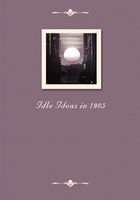
第54章 SHALL WE BE RUINED BY CHINESE CHEAP LABOUR?(5)
Ladies talk pretty about the dignity of labour,and are never tired of pointing out why gals should prefer domestic service to all other kinds of work.Suppose they practise what they preach.In the 'ouse,where there's only the master and the mistress,and,say a couple of small children,let the lady take her turn.After all,it's only her duty,same as the office or the shop is the man's.
Where,on the other 'and,there are biggish boys and gals about the place,well it wouldn't do them any 'arm to be taught to play a little less,and to look after themselves a little more.It's just arranging things--that's all that's wanted.""You remind me of a family I once knew,Mrs.Wilkins,"I said;"it consisted of the usual father and mother,and of five sad,healthy girls.They kept two servants--or,rather,they never kept any servants;they lived always looking for servants,breaking their hearts over servants,packing servants off at a moment's notice,standing disconsolately looking after servants who had packed themselves off at a moment's notice,wondering generally what the world was coming too.It occurred to me at the time,that without much trouble,they could have lived a peaceful life without servants.
The eldest girl was learning painting--and seemed unable to learn anything else.It was poor sort of painting;she noticed it herself.
But she seemed to think that,if she talked a lot about it,and thought of nothing else,that somehow it would all come right.The second girl played the violin.She played it from early morning till late evening,and friends fell away from them.There wasn't a spark of talent in the family,but they all had a notion that a vague longing to be admired was just the same as genius.
"Another daughter fancied she would like to be an actress,and screamed all day in the attic.The fourth wrote poetry on a typewriter,and wondered why nobody seemed to want it;while the fifth one suffered from a weird belief that smearing wood with a red-hot sort of poker was a thing worth doing for its own sake.All of them seemed willing enough to work,provided only that it was work of no use to any living soul.With a little sense,and the occasional assistance of a charwoman,they could have led a merrier life.""If I was giving away secrets,"said Mrs.Wilkins,"I'd say to the mistresses:'Show yourselves able to be independent.'It's because the gals know that the mistresses can't do without them that they sometimes gives themselves airs."WHY WE HATE THE FOREIGNER.
The advantage that the foreigner possesses over the Englishman is that he is born good.He does not have to try to be good,as we do.
He does not have to start the New Year with the resolution to be good,and succeed,bar accidents,in being so till the middle of January.He is just good all the year round.When a foreigner is told to mount or descend from a tram on the near side,it does not occur to him that it would be humanly possible to secure egress from or ingress to that tram from the off side.
In Brussels once I witnessed a daring attempt by a lawless foreigner to enter a tram from the wrong side.The gate was open:he was standing close beside it.A line of traffic was in his way:to have got round to the right side of that tram would have meant missing it.
He entered when the conductor was not looking,and took his seat.
The astonishment of the conductor on finding him there was immense.
How did he get there?The conductor had been watching the proper entrance,and the man had not passed him.Later,the true explanation suggested itself to the conductor,but for a while he hesitated to accuse a fellow human being of such crime.
He appealed to the passenger himself.Was his presence to be accounted for by miracle or by sin?The passenger confessed.It was more in sorrow than in anger that the conductor requested him at once to leave.This tram was going to be kept respectable.The passenger proved refractory,a halt was called,and the gendarmerie appealed to.After the manner of policemen,they sprang,as it were,from the ground,and formed up behind an imposing officer,whom I took to be the sergeant.At first the sergeant could hardly believe the conductor's statement.Even then,had the passenger asserted that he had entered by the proper entrance,his word would have been taken.
Much easier to the foreign official mind would it have been to believe that the conductor had been stricken with temporary blindness,than that man born of woman would have deliberately done anything expressly forbidden by a printed notice.
Myself,in his case,I should have lied and got the trouble over.
But he was a proud man,or had not much sense--one of the two,and so held fast to the truth.It was pointed out to him that he must descend immediately and wait for the next tram.Other gendarmes were arriving from every quarter:resistance in the circumstances seemed hopeless.He said he would get down.He made to descend this time by the proper gate,but that was not justice.He had mounted the wrong side,he must alight on the wrong side.Accordingly,he was put out amongst the traffic,after which the conductor preached a sermon from the centre of the tram on the danger of ascents and descents conducted from the wrong quarter.
There is a law throughout Germany--an excellent law it is:I would we had it in England--that nobody may scatter paper about the street.
An English military friend told me that,one day in Dresden,unacquainted with this rule,he tore a long letter he had been reading into some fifty fragments and threw them behind him.Apoliceman stopped him and explained to him quite politely the law upon the subject.My military friend agreed that it was a very good law,thanked the man for his information,and said that for the future he would bear it in mind.That,as the policeman pointed out,would make things right enough for the future,but meanwhile it was necessary to deal with the past--with the fifty or so pieces of paper lying scattered about the road and pavement.